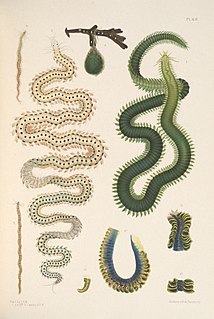
Henri Milne-Edwards was an eminent French zoologist.

Nereis is a genus of polychaete worms in the family Nereididae. It comprises many species, most of which are marine. Nereis possess setae and parapodia for locomotion. They may have two types of setae, which are found on the parapodia. Acicular setae provide support. Locomotor setae are for crawling, and are the bristles that are visible on the exterior of the Polychaeta. They are cylindrical in shape, found not only in sandy areas, and they are adapted to burrow. They often cling to seagrass (posidonia) or other grass on rocks and sometimes gather in large groups. They are dangerous to touch giving very painful long lasting burns. Nereis worms are commonly known as rag worms or clam worms. The body is long, slender, and dorso-ventrally flattened, reaching a length of 5-30 cm. The head consists of two parts: a roughly triangular anterior lobe—the prostomium—and a posterior ring-like portion—the peristomium. The latter bears a pair of terminal tentacles, dorsally two pairs of eyes, and ventrally a pair of short two-jointed palps.

Jean Louis Armand de Quatrefages de Bréau was a French biologist.

Aphrodita is a genus of marine polychaete worms found in the Mediterranean sea and the eastern and western Atlantic Ocean.

Edwardsia is a genus of sea anemones, the type of the family Edwardsiidae. They have eight mesenteries and live in tubes in the sand. The name, in New Latin, commemorates the French zoologist Henri Milne-Edwards.

Eubranchidae is a taxonomic family of sea slugs, marine gastropod molluscs in the superfamily Aeolidioidea, the aeolid nudibranchs.

Cladonematidae is a small family of anthomedusan hydrozoans. They have stolonal hydroid colonies, and their medusae are benthic and can crawl across the sediment; in many species they have lost the ability to swim however.
Eleutheria is an ancient and modern Greek term for, and personification of, liberty.

Phyllodoce is a genus of polychaete worms, which contains about 200 species. The prostomium bears eyes, two pairs of antennae and a pair of large retractile nuchal organs. The eversible proboscis is clearly divided into two parts.

Orbiniidae is a family of polychaete worms. Orbiniids are mostly unselective deposit feeders on marine detritus. They can be found from the neritic zone to abyssal depths.

Diopatra is a genus of polychaete worms in the family Onuphidae.

Antillesoma antillarum is the type species of the peanut worm genus Antillesoma. The genus belongs to the family Phascolosomatidae.

Amphinomidae, also known as the bristle worms or sea mice, are a family of marine polychaetes, many species of which bear chaetae mineralized with carbonate. The best-known amphinomids are the fireworms, which can cause great pain if their toxin-coated chaetae are touched or trodden on. Their relationship to other polychaete groups is somewhat poorly resolved.

Edwardsiidae is a family of sea anemones. Edwardsiids have long thin bodies and live buried in sediments or in holes or crevices in rock.

Sabellastarte is a genus of marine polychaete worms in the family Sabellidae.

Chloeia is a genus of marine polychaete worms.

Eulalia is a genus of polychaete worms.

Echiuridae is a family of spoon worms in the subclass Echiura. It is a monotypic family, the only genus being Echiurus. These worms burrow into soft sediment on the seabed.

Amphorina is a genus of aeolid nudibranch in the family Eubranchidae.
Cloeosiphon is a genus of worms belonging to the family Aspidosiphonidae.



















